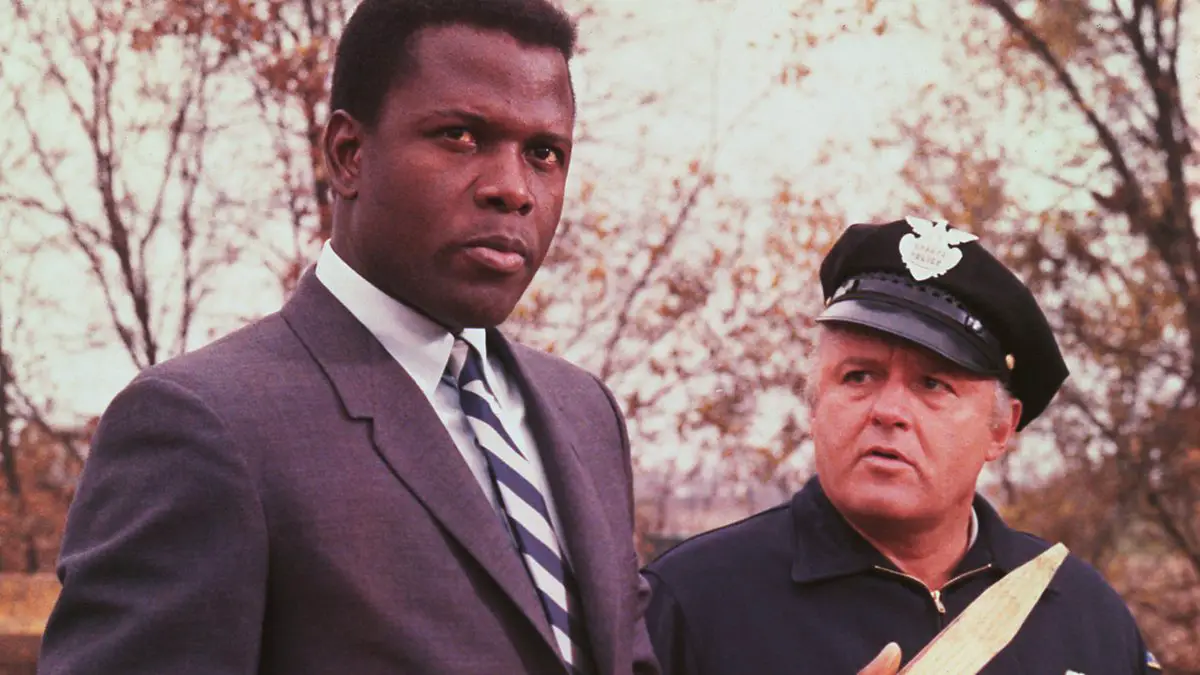
In the Heat of the Night, starring Sidney Poitier and Rod Steiger as very different officers of the law, is one of the best movies ever made.
“They call me Mister Tibbs!” – Officer Virgil Tibbs (Sidney Poitier) tells Bill Gillespie (Rod Steiger) when asked what he’s called in Philadelphia.
Officer Tibbs is waiting at a train depot to make his journey back to Philadelphia when he’s suddenly accused of killing industrialist Phillip Colbert. Tibbs knows they have the wrong man but because they’re in Sparta, Miss., police officer Sam Wood (Warren Oates) automatically suspects him because he’s both Black and has money. It’s classic racism at play but hey, this is the 1960s.
Tibbs and Gillespie are very different in style and personality. Every time that the police chief thinks they have the right man, Tibbs says that they don’t. If it were up to Tibbs, he’d go back to Philadelphia in an instant. However, it’s clear that the Sparta police are inept at doing their jobs. It’s no wonder that it takes until the final minutes to get the right man! Though to be fair, this is a mystery film and if we knew who did it at the beginning, well, there’d be no mystery there! But anyway, Gillespie clearly gains respect for Tibbs by the end of the film. Even though are times where he wants Tibbs out of town for his own safety, Tibbs is the type of detective to get the job done. That’s what I like about Poitier in this film. He’s dedicated to the job.
I love how filmmaker Norman Jewison is able to make films that are not even close in tone. Aside from The Cincinnati Kid, Jewison had mostly done comedies up to this point in his career. In the span of his entire career, In the Heat of the Night is one of the stand-outs. Jewison isn’t afraid of depicting a Southern town that hates outsiders although he’s going for an anti-racist tone in the film. Make no mistake that there are a number of racists in the fictional Sparta town–Sparta, Ill. stands in for the Mississippi town during filming. It’s clear as day when Tibbs is being followed and threatened with his life.
Tibbs isn’t afraid of standing up against the racist bigotry. We not only see this at the police station but with plantation owner Endicott (Larry Gates). When Endicott slaps Tibbs, Tibbs slaps him right back. This scene isn’t in the book but Poitier would only do it if he could counter-slap the racist right back.
Oscar came calling in April 1968 when In the Heat of the Night won Best Picture, Actor and three other Oscars for screenplay (adapted), editing, and sound. The film was also nominated for director and sound effects. But just like Guess Who’s Coming to Dinner in December, Poitier didn’t get an Oscar nomination for his work. Interestingly enough, Poitier won a Golden Globe for this film before the awards were controversial. If it were up to me, I would nominate Poitier for his work in both films.
One thing that does surprise me is how cinematographer Haskell Wexler isn’t nominated for his work. In the Heat of the Night was one of the earliest films to properly light Black actors. Regular lighting wouldn’t cut it and the end result is a beautifully photographed Sidney Poitier.
Another shocker is that Quincy Jones isn’t nominated for his work, which injects the film with a blues touch. Nor is the opening song sung by Ray Charles. While Jones composed the music, the lyrics were written by Alan and Marilyn Bergman. The Bergmans wrote the lyrics for three other songs. Marilyn Bergman passed away over the same weekend the film’s star, Sidney Poitier.
This was my first viewing of the film (I know, I know!). Even though I have my personal favorite of the bunch, I can definitely see why it won over films like The Graduate, Guess Who’s Coming to Dinner, and Bonnie and Clyde. Over 50 years later, In the Heat of the Night is still an important film when it comes to anti-racism.
DIRECTOR: Norman Jewison
SCREENWRITER: Stirling Silliphant
CAST: Sidney Poitier, Rod Steiger, Warren Oates, Lee Grant, Larry Gates, James Patterson, with William Schallert, Beah Richards, Peter Whitney, Kermit Murdock, Larry D. Mann, Matt Clark, Arthur Malet, Fred Stewart, and introducing Quentin Dean, Scott Wilson, Anthony James
United Artists released In the Heat of the Night on August 2, 1967.
Please subscribe to Solzy at the Movies on Substack.



